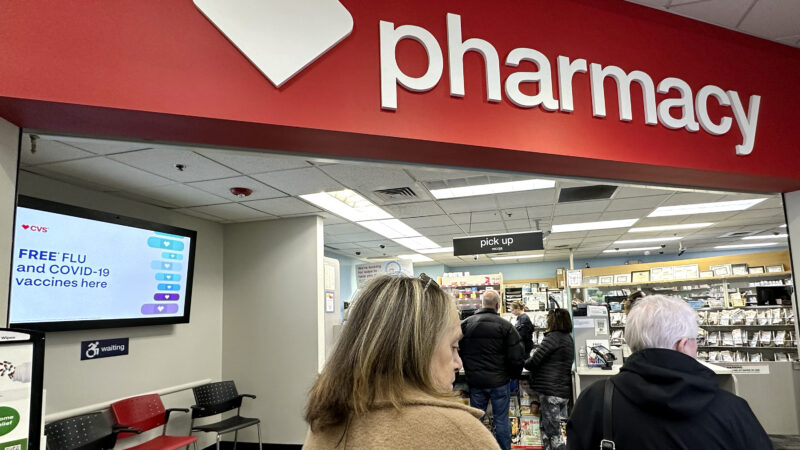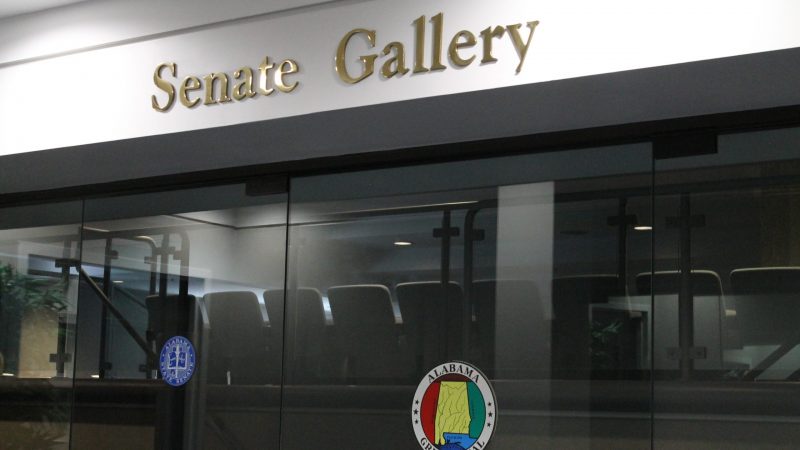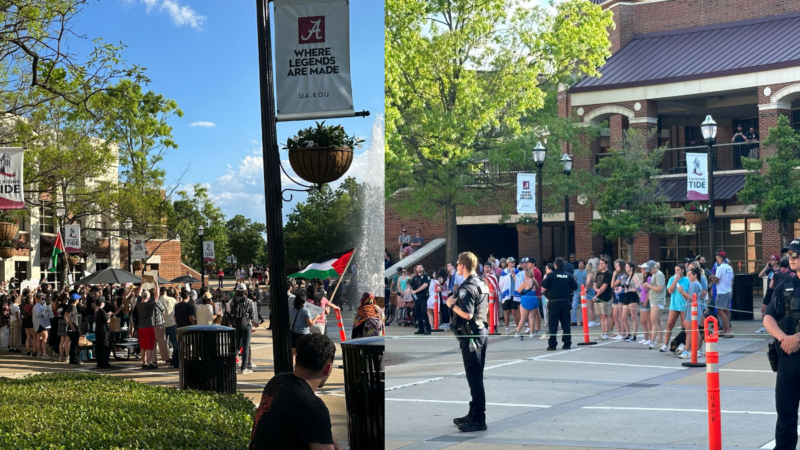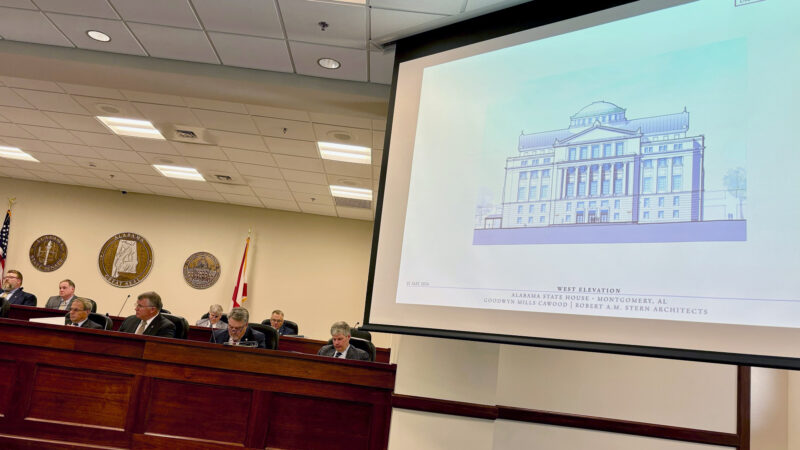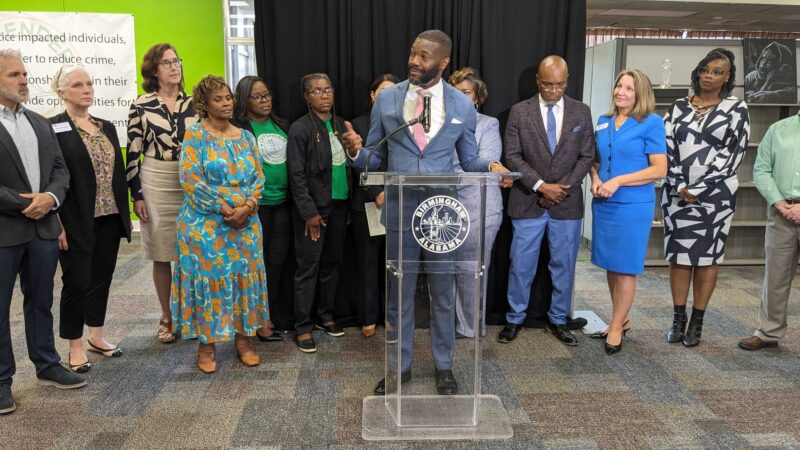Alabama pharmacists urge lawmakers to pass HB 238
A sign for flu vaccination is displayed on a screen as customers wait to pick up their medication at a pharmacy store in Buffalo Grove, Ill., Tuesday, Feb. 13, 2024.
At his pharmacies around Birmingham, pharmacist Patrick Devereux stocks a drug called Invega Trinza, a three-month injectable that can ease symptoms of psychosis. Devereux said the medication can help customers with significant mental illness remain independent and out of the hospital. But it’s expensive.
“Invega Trinza is $10,000 right now,” Devereux said. “That’s the acquisition cost of that drug, $10,000.”
That’s the price Devereux’s pharmacy pays to buy the drug from a wholesale supplier. Once they inject the medication into the customer’s shoulder, the pharmacy files for reimbursement.
In the case of Invega Trinza, Devereux said his pharmacies are reimbursed roughly $850 less than what they paid for it.
“We spent $10,000. We lost $850. And we took care of the patient anyway,” Devereux said. “We can’t keep doing it. We just can’t. Without some legislation, there’s just no way to continue to remain operational.”
Devereux is one of hundreds of independent pharmacists and pharmacy organizations across Alabama pleading their case to state lawmakers, asking them to approve House Bill 238.
Called the Fair Meds Act, the legislation would set payment requirements for pharmacy benefit managers (PBMs), companies that handle pharmacy benefit plans on behalf of insurance companies and employers.
The bill would require PBMs to reimburse pharmacies an average cost of a medication plus a dispensing fee of $10.64. The legislation passed out of the House Insurance Committee earlier this month and now awaits a vote by the full House.
“Everybody in this model will know exactly what those drugs cost that patient, what it cost the employer, what it cost the PBM,” said Republican Rep. Philip Rigsby, the bill’s sponsor. “It will not be a guesstimate of what medications are going to cost.”
He said the legislation would increase transparency and fairness by utilizing a statewide index based on the average acquisition price of medications in Alabama.
But opponents of the bill said the proposed rules would prompt PBMs and insurance companies to increase their prices.
“We all know that nothing is free,” said Robin Stone, executive director of the Alliance of Alabama Healthcare Consumers, a lobbying organization that represents large employers in the state.
Stone said the new pricing model would lead to higher health insurance premiums and copays.
“And insurance benefits are paid by hard-working Alabamians. They will bear the cost of this new tax,” he said.
Officials with the Retirement Systems of Alabama (RSA), who manage a healthcare plan for state employees and retirees, also worry about the legislation.
“We’re very concerned about how difficult this is going to make it for us to continue to manage the funding of the plan and provide the same level of benefits to members,” said RSA legislative counsel Neah Scott.
Supporters of the bill acknowledge the legislation could lead to higher insurance costs, though they argue the change should ultimately decrease costs, because it would mandate transparency and standardize prices among PBMs.
Pharmacists also stress that the $10.64 dispensing fee is a charge to cover the costs of doing business. It is not a tax.
They warn that if the bill doesn’t pass, some smaller pharmacies might have to close, especially in rural communities. More broadly, they said pharmacies across the state may have to stop carrying medications that generate a negative reimbursement.
“If you want access to care, if you want access to not have to drive 20 minutes, 30 minutes to get a prescription filled, this (bill) is something that needs to happen,” Devereux said.
Gambling bill in doubt with three days left in the legislative session
Alabama lawmakers are coming down to the finish line for this year’s legislative session. Many bills await passage, but perhaps the biggest one up in the air is a lottery and gambling bill.
Pro-Palestinian demonstration draws counter-protest at University of Alabama
Students gathered demanding the school call for a permanent and immediate ceasefire and to push the school to sever ties with defense contractor Lockheed Martin.
A new Statehouse and related projects will cost about $400 million
The Alabama Legislative Council, a 20-member panel comprised of legislative leaders and their appointees, approved the construction of the new Statehouse last year. The panel was given an update on the project on Wednesday.
New pilot program will offer housing, resources to people leaving prison
The Birmingham Reentry Alliance will provide wrap around services to dozens of men and women adjusting to life after prison.
Alabama committee advances ban on LGBTQ+ pride flags in classrooms
The Senate Education Policy Committee voted 5-2 for the House-passed bill, putting the proposal in line for a possible final passage in the last four days of the legislative session.
A New Orleans garden paid hundreds of dollars in fees for a sewer that doesn’t exist
Galvez Garden owner Lissie Stewart has been fighting the New Orleans Sewerage and Water Board over inaccurate billing for years.
